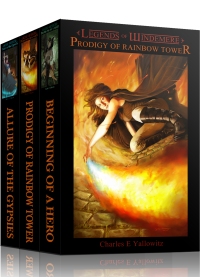L. Marie asked the following question on my Ask an Author page:
Do you see yourself writing a science fiction series someday?
An interesting question that I’m sure can lead to a debate because I’ve noticed that not everyone has the same definition of fantasy and science fiction. That’s where my decision will lie, so let me explain that first.
Fantasy is a story that takes place in a non-reality setting where magic exists or technology is not at our current level. There is more flexibility of natural laws and species walking around are not designated as aliens. Science Fiction has a foot in reality with a focus on science and technology. Magic is not involved or is explained in a more scientific method to make sure the laws of nature are upheld. There’s more to this, but those are the basics to get me going.
I had a few science fiction stories on my plate, but I’ve dropped them into Windemere because I failed on the science part. The outlines never happened because I was always scared that I’d explain something poorly and that would get everyone declaring that I’m a ‘science idiot’. To be fair, I am and I tend to ignore laws of nature by using magic to get the scene I want. I like that fantasy gives me more freedom of action and there’s no worry that I missed something that would unravel the entire world. I know people hate the explanation of ‘a wizard did it’, but I do think it works if you establish magical rules and stick with them. In science fiction, you can’t really do that without factoring in reality.
That being said, I have the gnomes who create technology that bring an occasional ‘sci-fi’ feel to the world. So I can’t say I avoid the genre completely. I guess I simply feel safer in a world where I make the rules and have, what I see as, ultimate flexibility.






Though, I do plan on venturing into sci-fi when I finish my fantasy trilogy (working on book 2), I’ve had some of the same thoughts you have regarding the two sub-genres. Fantasy allows more freedom for the imagination. Sci-fi is a bit more grounded.
LikeLike
Hard to admit that I don’t have the mind for sci-fi, but I think that’s what I realized when I finished writing the post.
LikeLike
Ultimately, it’s all semantics, but I prefer the term “Imaginative Fiction” as an umbrella for any fiction with fantastic elements. From my point of view, the difference between imaginative and “Speculative Fiction” is that in speculative fiction there is an attempt to explain the story elements outside of established reality with science: “I *speculate* that if this and this are scientifically accurate that *this* might happen…”
For contrast, in imaginative fiction the statement could be: “This happened, how it works isn’t important, but here is how that affects the story…” 🙂
LikeLike
Interesting. What about readers who demand to know how something works? I see it a lot these days where people get angry about a fictional event that doesn’t go into detail about the causes. One probably shouldn’t be focused solely on that mentality, but it can be shocking.
LikeLiked by 1 person
I try to describe things from the character’s perspective, and usually the technicalities aren’t important. Only the affects. Here is an analogy: present day people use computers, watch TV and benefit from lifesaving medical care and drugs. How many of us can explain in any detail how they work? Only a small percentage compared to the large majority of people that use that same technology daily, and often quite well. It might as well be magic to them… Clarke’s Third Law. 🙂
LikeLike
That analogy definitely clears it up. Need to remember it.
LikeLiked by 1 person
Experience has taught me that I prefer very near science fiction. (as a writer. Anything goes as a reader.) I like to use our world and add something that might occur in the next year. I also believe elements can cross over frequently, and readers will dig it. e.g. The Force, the mind meld.
LikeLike
The Force is an interesting example. It really seems magical, but I’ve heard people try to give it a scientific explanation.
LikeLike
It was fine as it was. When they brought in metachlorians it ruined it for me.
LikeLike
Wonder if those will get retconned out.
LikeLiked by 1 person
According to the chart, my two novels would be classed as soft science fiction. I work hard to ensure they adhere to the laws of science as far as possible but I then like to play around with possibilities. The key issue for me is plausibility. As long as the reader believes it could happen, I can include it. If the reader objects, which in turn takes them out of the story, then I’ve failed.
The biggest mistake in science fiction is to try to explain everything. If detail is key to what’s happening (like in Andy Weir’s The Martian), then it’s fine to include it. In most cases you don’t need to and probably shouldn’t. Star Trek didn’t describe how teleportation worked, but it didn’t stop theoretical physicists working out a possible way to do it.
LikeLike
Interesting. Never really noticed that. I was always made to feel like I have to explain everything so the reader had no technical questions.
LikeLike
I don’t even think in hard sci-fi you have to explain everything, it just has to be accurate to our current scientific knowledge. Many hard sci-fi writers will do the calculations to work out if something is possible or not, but it’s rare they’ll show those calculations.
LikeLike
Kind of like how a fantasy author might not use every nuance of a magic system. At least until it can be mentioned without coming off purely as an info dump.
LikeLike
Exactly. You might wish to explain the basics of how magic works and its limitations, but what the red sparks are made from that have just flown from the wizard’s fingertips to broil a goblin inside his armour.
LikeLike
Poor goblins are always the guinea pigs.
LikeLiked by 1 person
Thanks for answering my question, Charles. Everything falls under the speculative fiction umbrella. But your great explanation helps us see the differences between science fiction and fantasy.
I started a science fiction novel ten years ago, which seems extremely archaic now. I feel unqualified on the science end of things. Now I regret that I didn’t pursue physics like my physics teacher suggested that I do.
LikeLike
You’re welcome. I say stick with it and see if you can give it an upgrade.
LikeLike
I wish I could. But when I sent it out on submission, a year later, someone came up with a videogame with a similar premise. So I decided to let the novel die.
LikeLike
Which video game? That happens to a friend of mine all the time. I suggested doing a few tweaks and pointed out other media that was similar to the game. A lot of stuff has similar premises and still becomes extremely popular.
LikeLike
I suppose that it is best to stay with you are most comfortable with. I would have a problem with Sci-Fi as well as you are bound to piss someone off who sees the flaws in your science.
LikeLike
Yup. I tend to like magic more anyway.
LikeLike
I read both fantasy and sci-fi, but I’m much pickier about the sci-fi I read. I try to avoid sci-fi that I know just can’t happen, but in fantasy I don’t have that problem; I accept that it can’t happen (though whatever laws there are need to make sense).
But as a writer, I would be more inclined toward sci-fi. That’s a helpful chart. 🙂
LikeLike
So do you think your existing knowledge of science makes it harder to enjoy some sci-fi?
LikeLiked by 1 person
Yep. Start to think critically until I can trust that the science is plausible.
LikeLike
My question is why anyone would want you to change your style and content, when they’re already enjoying your work?
LikeLike
Probably the inherent nature of people to improve upon things. They like what they see, know of other things they want, and try to get the best of both worlds.
LikeLike
If it helps, my way around the science idiot conundrum is to explain the technology with a science that even scientists have difficulty understanding: quantuum physics. Although to be honest, mine’s just a fantasy story with futuristic technology in it. I market the series as both. 😉
Cheers
MTM
LikeLike
So when in doubt, go for the confusion? I tend to go with magi-tech, but I think being in a fantasy world allows that. Wonder how quantum physics would even be mentioned in a world with magic.
LikeLike
Reblogged this on Boondoggling with Bojenn.
LikeLike